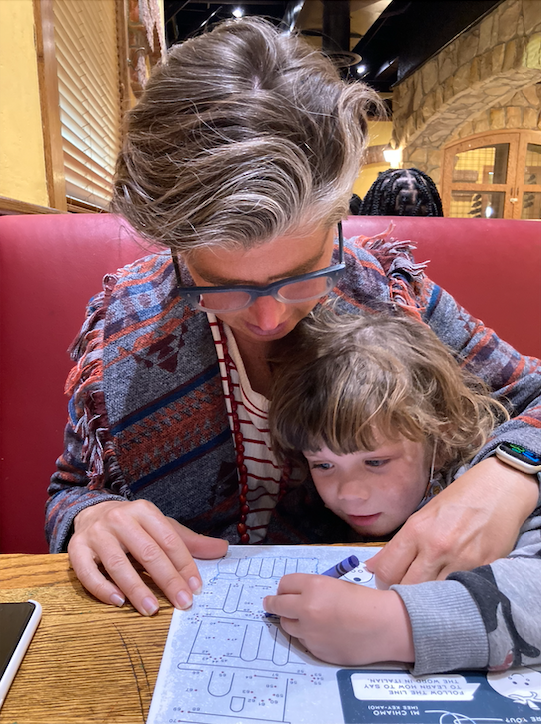
So much has been said and written about the Supreme Court’s leaked majority opinion draft overruling Roe v. Wade that I hardly need to elaborate the basics. I’m not a reproductive justice expert, nor am I particularly surprised that this has happened–they are simply doing precisely what they were hired to do, which is to promulgate a theocratic, sex-negative worldview. The reason I add my voice to the cacophony is that I have a somewhat unorthodox, nuanced position on this debate, which hasn’t (I think) been aired yet–that of an adoptive mom.
We adopted our beloved son as an infant from a state that frowns upon abortions. My son’s amazing birthparents’ struggles, dilemmas, and decisions are their private business and I will not air it here or anywhere else. What I can share is that, throughout our happy life together, I have been beyond ecstatic that the world has been blessed with my son, a sparkling star of a boy–bright, empathetic, loving, friendly, kind, athletic, funny, multitalented, spirited, lively. And at the same time, every adoption involves a huge leap of love and empathy, and much pain, grief, and loss adjacent to the joy. There are no hard or fast rules about the roads taken or not taken with pregnancies. The deep regrets of placing a child for adoption, the sometimes unsurmountable hardships of parenting, and the deep regrets of terminating a pregnancy all float in a realm of possibility that I can only imagine, having been raised in a welfare state with excellent sex education and easily available contraceptives. No assumption can be made, as the right makes, that abortion invariably leads to shame and regret (see this remarkable amicus brief on behalf of law professors who underwent abortions and “believe that, like themselves, the next generation of lawyers should have the ability to control their reproductive lives and thus the opportunity to fully participate in the ‘economic and social life of the Nation’.”) Of course, the opposite assumption–that abortion brings you your life back without a trace of regret or sorrow, is also false, and part of the reason many women can’t quite find themselves in the pro-choice milieu is that, in the fierce struggle for women’s rights, little room is left to contain these sorrows and regrets.
The philosophical debate about when life begins is, to my mind, a red herring. For what it’s worth, and this may surprise my lefty friends, on the abstract philosophy point I’m with the pro-lifers: I do believe that a form of life–sentience–begins at conception, and I find that congruent with my sentiments on other aspects of sentience, such as nonhuman animal rights. The problem is that the pro-life right-wingers lose interest in supporting said life from the moment it emerges from the womb, as evidenced by the lack of parental leave, child care, quality early education, and decent, government-funded healthcare for all. They are also not interested in sparing such life from emerging in the first place through comprehensive sex education and widely available contraceptives.
All of this has already been said, most eloquently, by others; but the right-wingers have a ready-made answer. “Not to worry!” They cheerfully squeal. “That’s what adoption is for!” Which is where, as an adoptive mom, I need to speak up and disabuse some of the truly ridiculous illusions that our right-wing politicos and fundamental Christian buddies are willing to entertain. Namely, the notion that limiting safe, legal abortion is going to result in a boon for adoption should be patently absurd to anyone who has gone through an ethical open adoption process; the opposite is true.
Adoption professionals recoil from the idea that adoption is about “selling children”, and from here flow multiple ethical and legal limitations on the kind of assistance that adoptive parents can offer birthparents and on the interactions between the party. And yet, beyond the niceties, let’s start with the obvious: in virtually every adoption, as ethical and kind and caring as it is, children pass from poor hands to more economically advantaged hands, with money moving in the opposite direction. This means that birthparents–usually birthmoms–are at a considerable socioeconomic disadvantage, often exacerbated by being typically younger than the adoptive moms.
Forcing women who would otherwise have a (legal, safe) abortion to instead carry a pregnancy to term and place their infants for adoption throws more young women and girls with no bargaining power into the mix–often women and girls who now have to hide their pregnancies from families and boyfriends. It is not difficult to predict that women who are less equipped to carry a pregnancy to term would be the ones seeking abortions, and that requiring them to forego that option will result in pregnancies that are less safe, and therefore in infants that are more difficult to place for adoption. Hiding your pregnant belly from your mom or your friends can result in experiencing your pregnancy under conditions that are bad for you (exposure to smoke, exposure to alcohol, unhealthy diets); having such a pregnancy discovered can result in being unhoused for the duration of your pregnancy; all this instability will surely result in less responsible and consistent prenatal care.
A birthmom who knows she can’t parent will then search the Internet high and low for adoption agencies, trying to find one with serious social workers and good services. She’ll then go through an intake interview with a social worker, who will ask her about her medical history, prenatal care, and use of alcohol/drugs. I’ve taken classes with other adoptive parents: the medical history is something that can be scary for prospective parents, and birthmoms can, of course, guess this. So, what happens when someone who has not had the resources to properly care for themselves and their baby tries to place said baby for adoption? Would it surprise anyone if this would result in more deceit and evasion when interviewed by adoption agency social workers?
I can see very unhealthy prospects for the adoption market under such circumstances. With the inability to verify pregnancy details, or to provide proper care to prospective moms, unscrupulous lawyers and corrupt social workers might step in with unhealthy incentives, pressure, and coercion–akin to the worrisome trends we see in the international adoption market. This means less safety and trust precisely in a situation that requires an enormous amount of empathy and mutual trust. It means less careful vetting of adoptive parents–the actual people who are to raise and nurture this precious life. And it also means that women who might withstand the pressure and try to parent their kids might have to later relinquish them by court order, or due to other awful circumstances, which throws kids into the traumatizing world of government care at an early age and creates considerable challenges even in the happy cases that end in fostering and adoption. Many people who can become fantastic parents to infants through open adoption might not have the emotional fortitude and resources to address and heal the trauma of older kids. Corollary: Throwing birthmoms into these situations ahead of time by eliminating a safe, legal option, is not a boon for adoption–the opposite is true.
Additionally, if, indeed, adoption is to be the panacea for the problem of sentient life, then we should also care about the life of the birthmom after adoption–in the form of extended services to help heal the trauma, beyond some meetings with a social worker: I’m talking college money, gym membership, grocery money, job seeking support. Of course, all this assumes that Alito et al. truly want birthmoms, after giving the gift of motherhood to someone like me, to land on their feet and “fully participate in the ‘economic and social life of the Nation.” Do they?
The truth is that none of this is really about abstract notions of sentience nor about seeing the abortion/adoption thing as a zero-sum game, because it is patently clear that neither value is being advanced by forcing women to carry pregnancies to term or risk a dangerous back-alley procedure. Friends, here’s what’s going on: Justice Alito and his buddies are simply out to penalize women (the wrong sort of women?) for having sex. That the punishment might extend to other (sentient) people in the equation–a child, adoptive parents, adoption professionals–simply does not enter into their equation. The idea that someone who receives solid, reasonable, science-based sex education should be able to just say yes to sexual activity with whoever they choose, with however many people they choose, in whatever form, in whatever frequency, so long as all are of sound body and mind and consent and respect each other, is anathema to them. They know that legal prohibitions will not deter young people who have been deliberately left ignorant about the functions of their own bodies from having sex. They don’t care. Because they don’t intend to ever pick up the price tag for the many young lives that will later end up in flux, this is a complete externality to them. And that is what is so atrocious here.




No comment yet, add your voice below!